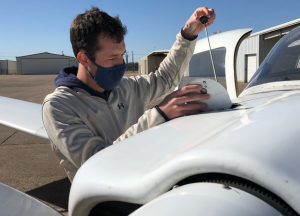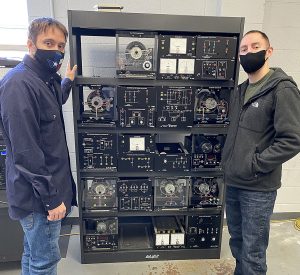(WACO, Texas) – Dylan Durst said he was glad to be back in the cockpit as he took off for his first flight late last spring at Texas State Technical College’s airport in Waco after a two-month break due to the COVID-19 pandemic.
“It was about picking up where you left off,” he said.
Durst, who grew up in Mason and graduated from high school in Katy, is pursuing an Associate of Applied Science degree in Aircraft Pilot Training Technology at TSTC. He is scheduled to graduate this spring.
Durst and other students returned to classes and flew briefly after spring break in March of 2020. When TSTC converted classes to online and temporarily ceased face-to-face learning later that month, flight students were grounded until late May. The program then implemented a hybrid learning approach.
“We have been very fortunate that we have been able to continue operations in a manner that has proven safe,” said Greg Russell, chief instructor in TSTC’s Aircraft Pilot Training Technology program. “It may sound cliche, but our success as a department has come from the aviators’ ability to constantly evaluate and mitigate risks while adjusting to an ever-changing environment.”
The program’s 12 certified flight instructors returned to campus in early May to do training on sanitizing techniques and personal protection equipment. Students returned in mid-May for a week of their own health and safety training. The instructors and students also studied material data safety sheets to know all of the chemicals to be used for sanitizing aircraft before and after flights.
Everyone must abide by health and safety guidelines from TSTC and the Centers for Disease Control and Prevention regarding hand washing, masks and social distancing when possible.
“It’s been extraordinary for sure,” said Ryan Lee, a flight instructor at TSTC. “The students have done well adapting to the protocols and procedures.”
Before students climbed back into the cockpit, they spent time using flight simulators to acclimate themselves to flying after their break. Durst said he was glad to have that opportunity to focus his mind again on flying.
Russell stressed the importance of students’ experience with actual planes.
“Our program requires that students be hands-on in the aircraft to practice procedures, checklists and aircraft control,” he said. “Students and our department would not have survived to this point without the ability to use in-person training.”
Lee said that due to the airplane sanitizing the students must undertake, flight blocks have been extended from two hours to two and a half hours. Students are required to fly at least three times a week. Lee said the increased flight time is good for students because they get to spend more time flying with instructors.
“We lost a lot of ground with our students,” Lee said. “We had a huge gap to make up with the students to make them proficient.”
There are positive aspects that Durst and Lee are taking away from the pandemic’s changes to teaching at TSTC.
Lee predicts better sanitizing operations for airplanes in the future.
“People expect to travel,” he said. “I think we are still in the golden age of transportation. I think we will bounce back really quickly.”
According to the U.S. Bureau of Labor Statistics, there will be a need for 45,000 commercial pilots by 2029. The number of airline pilots, copilots and flight engineers is projected to grow to more than 87,000.
“Right now would be the best time to start their aviation training,” Lee said. “The new students really need to know that a lot of the airlines offered early retirement to pilots. There will be a new shortage of pilots along with the preexisting shortage.”
For more information on Texas State Technical College, go to tstc.edu.








